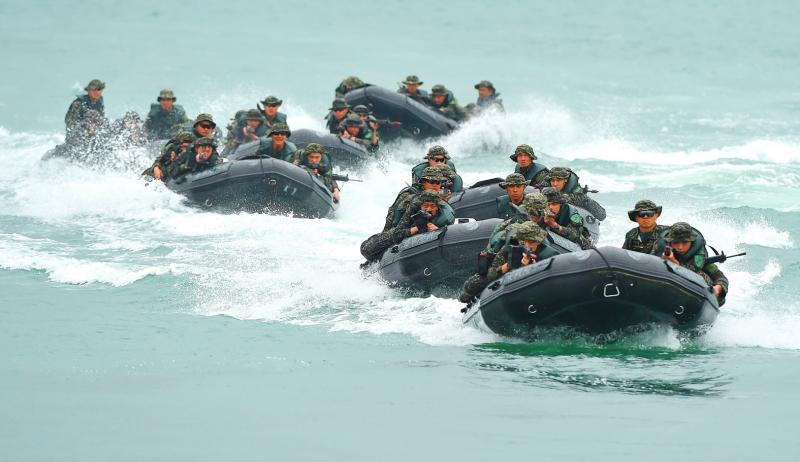Live-fire drills are to be held from July 25 to 29 to simulate the defense of the Port of Taipei against a Chinese attack, a military officer said yesterday.
The drills are part of the annual Han Kuang military exercises and would focus on defense scenarios of the port in New Taipei City’s Bali District (八里) and the nearby Tamsui River (淡水河) estuary, the officer said on condition of anonymity, as they were not authorized to speak to the media.
If the port and the estuary were to be captured by invading Chinese forces, they could unload military equipment near the capital, the officer said.

Photo: Liu Hsin-de, Taipei Times
The drills would simulate Chinese forces attacking with fighter jets and helicopters, as well as a joint counterattack by Taiwan’s armed forces, they said.
Another military source earlier said that if Chinese forces were to capture the mouth of the Tamsui River, which is 8km from the Guandu Bridge connecting Taipei and New Taipei City, they could advance toward the headquarters of the nation’s major political institutions and farther into northern Taiwan.
Blowing up the bridge has been part of defense simulations over the past few years, the second source said.
The annual exercises are intended to improve the military’s’ capability to engage in asymmetric, cognitive, information and electronic warfare, and mobilize reserve forces to enhance overall defense readiness by incorporating civilians, said Major General Lin Wen-huang (林文皇), who is in charge of combat and planning affairs at the Ministry of National Defense.
This year’s live-fire drills would also focus on eliminating invading forces at sea and along the coastline, Lin told a news conference in May, adding that the three branches of the military and a wide range of weapons systems would be deployed.
The Han Kuang exercises, first held in 1984, are Taiwan’s most important military drills and seek to test the country’s combat readiness in the event of a Chinese attack.
This year’s tabletop wargames phase, the first of the two-part exercises, took place from May 16 to 20.

Taiwan has received more than US$70 million in royalties as of the end of last year from developing the F-16V jet as countries worldwide purchase or upgrade to this popular model, government and military officials said on Saturday. Taiwan funded the development of the F-16V jet and ended up the sole investor as other countries withdrew from the program. Now the F-16V is increasingly popular and countries must pay Taiwan a percentage in royalties when they purchase new F-16V aircraft or upgrade older F-16 models. The next five years are expected to be the peak for these royalties, with Taiwan potentially earning

STAY IN YOUR LANE: As the US and Israel attack Iran, the ministry has warned China not to overstep by including Taiwanese citizens in its evacuation orders The Ministry of Foreign Affairs (MOFA) yesterday rebuked a statement by China’s embassy in Israel that it would evacuate Taiwanese holders of Chinese travel documents from Israel amid the latter’s escalating conflict with Iran. Tensions have risen across the Middle East in the wake of US and Israeli airstrikes on Iran beginning Saturday. China subsequently issued an evacuation notice for its citizens. In a news release, the Chinese embassy in Israel said holders of “Taiwan compatriot permits (台胞證)” issued to Taiwanese nationals by Chinese authorities for travel to China — could register for evacuation to Egypt. In Taipei, the ministry yesterday said Taiwan

‘LIKE-MINDED PARTNER’: Tako van Popta said it would be inappropriate to delay signing the deal with Taiwan because of China, adding he would promote the issue Canadian senators have stressed Taiwan’s importance for international trade and expressed enthusiasm for ensuring the Taiwan-Canada trade cooperation framework agreement is implemented this year. Representative to Canada Harry Tseng (曾厚仁) in an interview with the Central News Agency (CNA) said he was increasingly uneasy about Ottawa’s delays in signing the agreement, especially as Ottawa has warmed toward Beijing. There are “no negotiations left. Not only [is it] initialed, we have three versions of the text ready: English, French and Mandarin,” Tseng said. “That tells you how close we are to the final signature.” Tseng said that he hoped Canadian Prime Minister Mark Carney

Taiwan is awaiting official notification from the US regarding the status of the Agreement on Reciprocal Trade (ART) after the US Supreme Court ruled US President Donald Trump's global tariffs unconstitutional. Speaking to reporters before a legislative hearing today, Premier Cho Jung-tai (卓榮泰) said that Taiwan's negotiation team remains focused on ensuring that the bilateral trade deal remains intact despite the legal challenge to Trump's tariff policy. "The US has pledged to notify its trade partners once the subsequent administrative and legal processes are finalized, and that certainly includes Taiwan," Cho said when asked about opposition parties’ doubts that the ART was